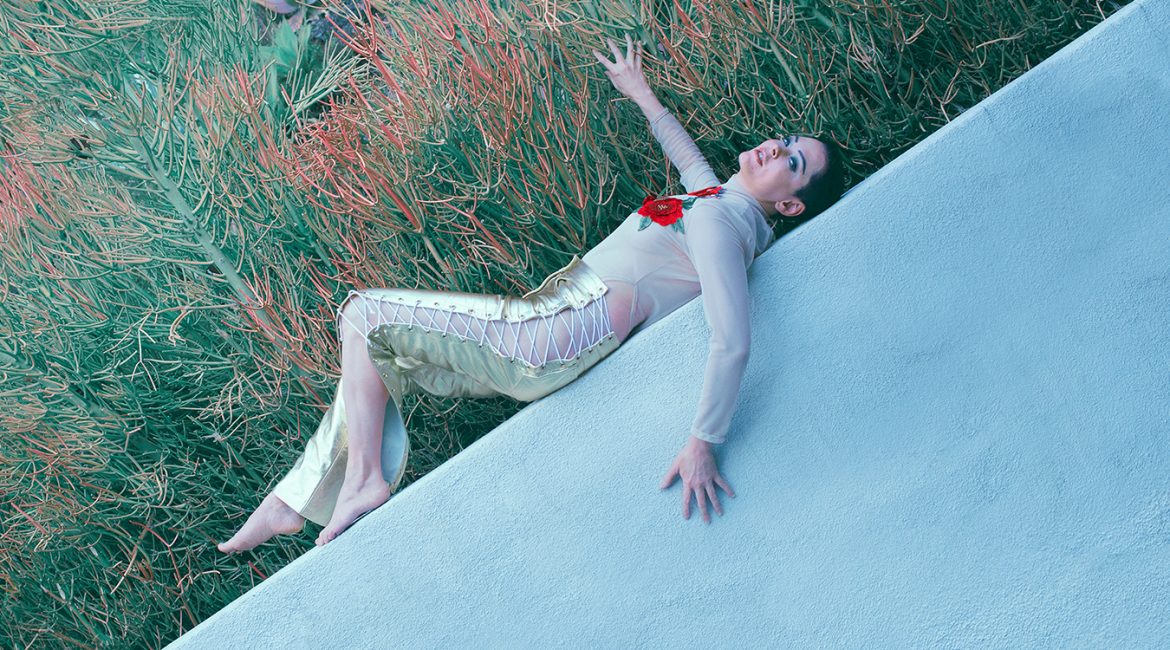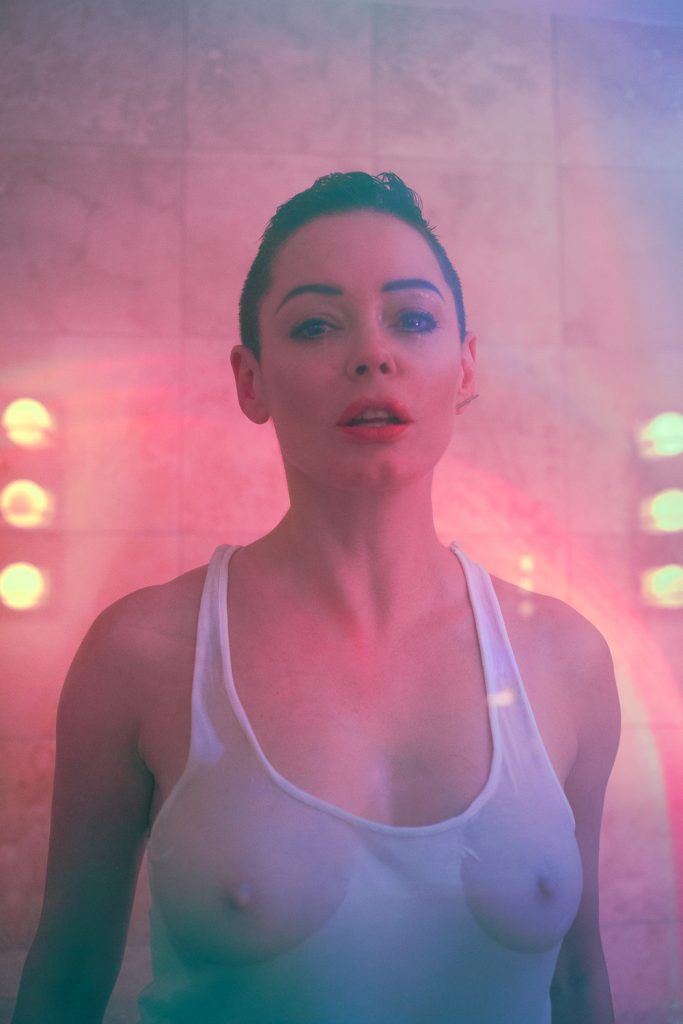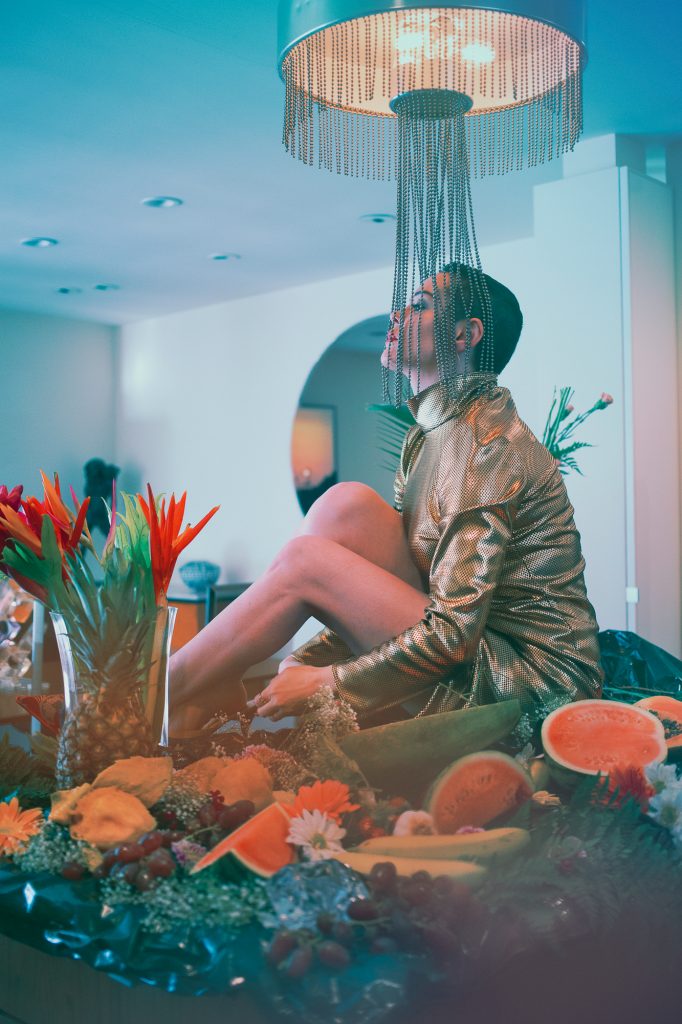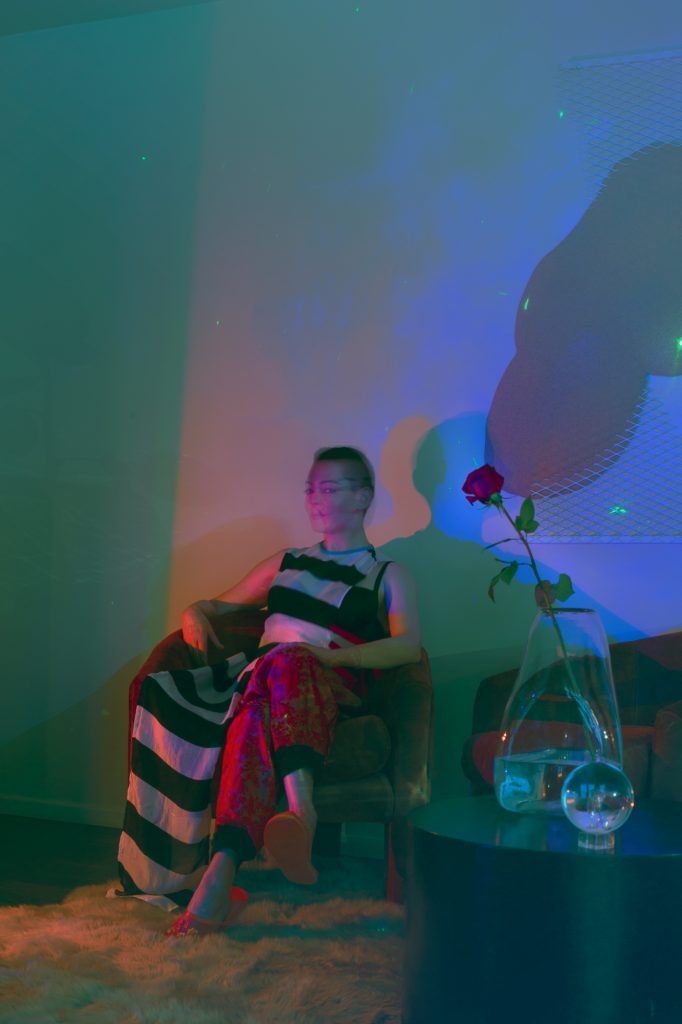Rose McGowan is not here for your consumption. Much like her character Amy Blue, in Gregg Araki’s 1995 film Doom Generation, McGowan takes no bullshit, and pulls no punches. Her passionate intellect and sharp attention to detail have made her something of a creative shape shifter, taking on roles that forever changed the landscape of independent cinema. While mainstream America may recognize her primarily from a certain witchy television series, it is her standout performance in camp, horror, and cult classics such as Scream, Jawbreaker, and Grindhouse that have come to define her career. Like so many female actors, McGowan has been previously defined in the media by her highly sexualized, femme fatale characters, as opposed to her intelligence and creative talent. After decades of navigating the dark alleys and hairpin turns of the movie-making business, McGowan is living in the light, and determined to recruit the world into a “cult of critical thinking.”
Image (Right): Eyewear: Mercura / Bottoms: Knorts
During a phone call in late May, one of the first things we discuss is her status as an icon to queer femmes; the way she carried herself through Hollywood bullshit, and gave an intense amount of punk grit to her roles, set her apart from many of the other girls “playing nice” on our screens. Every year, without fail, her sheer 1998 Video Music Awards show dress is touted out as one of the most infamous red carpet looks of all time. In many ways that walk is a perfect metaphor for McGowan’s attitude towards being typecast according to her looks — taking that sentiment to the extreme as a “fuck you” to the industry. As is true with many young women, McGowan’s relationship to her bombshell appearance was extremely fractured. “I didn’t so much plan on utilizing all of those external things — it was kind of like a Jessica Rabbit, ‘I’m not bad, I’m just drawn this way,’ thing. That attention was fundamentally strange and very much at odds with my personality. In many ways I was a passenger — it is very similar to a trance. People are reacting to your aesthetics, and treating you like you are your outsides; your life is judged and predicated by the world, but inside you’re just a passenger. What I was left with was making choices on screen that would communicate to people who I really was — I hoped to inspire through the strength of my characters.”
“What I was left with was making choices on screen that would communicate to people who I really was — I hoped to inspire through the strength of my characters.”
While McGowan’s penchant for rebellious and quick-witted characters endeared her to audiences and directors, it often did not provide substantial outlets for her drive or creativity. “A lot of the time I felt like I was trying to knock it out of the ball park but I was only given enough material to get to second base. My thing with acting was: if I am going to do this, I am going to kill it. I didn’t want to be just another random woman on a screen — the sex bomb that gets murdered so you’ll be like ‘what a cool death scene.’” In 2001 McGowan joined the cast of Charmed, a Warner Brothers series about a group of witch sisters. While the show catapulted McGowan to mainstream celebrity, it also left her disconnected and adrift. “I’d always heard that you could get lost in a character. Everyone assumes it’s all method, like Daniel Day Lewis out in the woods somewhere. In fact, it’s more insidious. I guarded my own turf in Hollywood for so long until that TV show and I just got lost in it — it was like I astral-projected right on out of there for five years. I went on a mental hiatus and my body was completely managed by other people.”
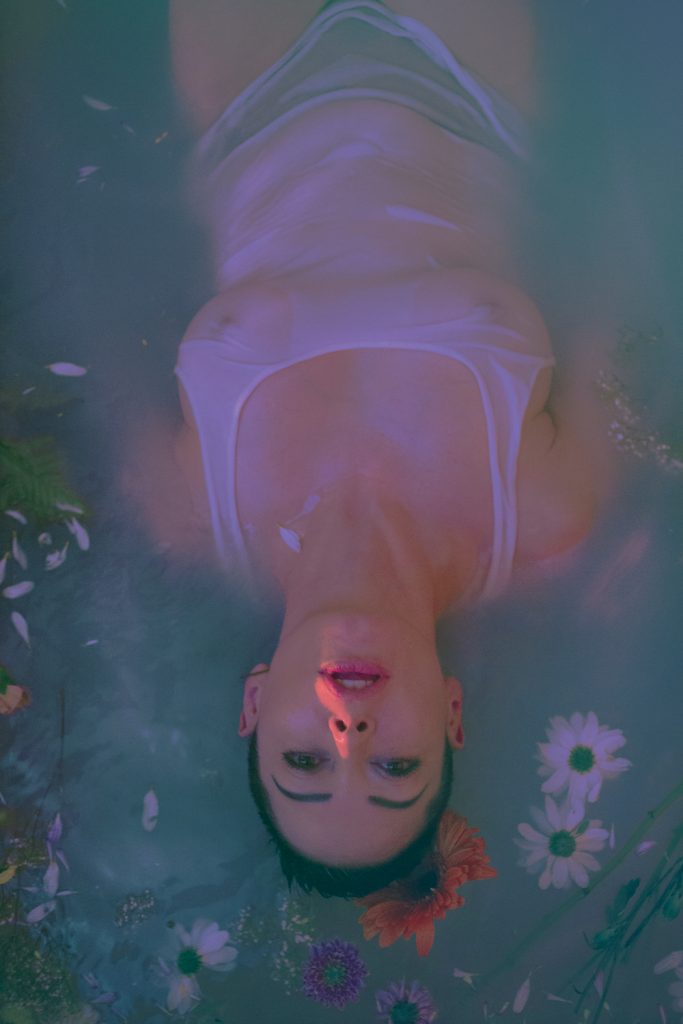
Treacherous as it is glamorous, the sordid politics of Hollywood are not news to anyone familiar with the industry. Rampant predatory behavior, artistic plagiarism, and flippant commodification — the entertainment business is a cult of influence. “After I did my first movie, I was told by a female agent that I had to have long hair otherwise Hollywood wouldn’t want to fuck me, and if they didn’t want to fuck me, they wouldn’t hire me. It stands to illustrate how at the time I just thought “okay!” I was marketed as a thing put on Earth to stimulate men and make other girls jealous. It’s Hollywood’s version of taking what’s really unique and special about you and commoditizing it.” Times have changed. In 2015, McGowan was fired from her one of her agencies, Innovative Artists, for exposing just one of the many sexist and condescending hoops actresses have to jump through during the casting process. “The whole thing with Hollywood and me now is that I don’t, literally, give a fuck if they accept me in any way shape or form. Why? Because I don’t accept them.”
“I was marketed as a thing put on Earth to stimulate men and make other girls jealous.”
If anyone knows how to break through the politics of cult thinking, it’s McGowan, who spent the greater part of her childhood in Children of God (COG), a cult sect that combined the free love ideals of the late 1960s with dogged worship of Christian beliefs. Notorious, like many cults, for a variety of abuses including encouraging children to “be sexually active,” COG was an early battleground for McGowan, who rejected the religious corruption she saw permeating her community. “When I was four they would ask me every day if I had let God into my heart, and I would say no, not today, try again tomorrow.” For McGowan, the experience was an education in the mechanics of manipulation. “I think people fundamentally misunderstand cults; they always have this idea that control is this bombastic creature, a mystical figure who entrances everyone. What they don’t understand is that it’s cross hypnotizing — everybody is hypnotizing each other all the time. It’s all crisscross brainwash, because if one person falls out of the trance, the whole thing falls down.”
Image (Left): Dress: Shahista Lalani / Earrings: AOKO SU / Rings: AOKO SU / Shoes: Gabriel Held Vintage // Image (Right): Top: Geoffrey Mac / Pants: yoloforlife
Down the rabbit hole at this point, we discuss the Manson Family girls, who each had an essential role in recruiting and disseminating the “family values.” Sex, charm, collusion, and drugs were all used to lure in well-connected music industry johns and drug dealers, as well as additional members — in particular teenage runaways. The trust developed between women, young women in particular, has long been abused for the agendas of the patriarchy. Rose relates this concept to her own experience of the movie business: “if you’re stranded, and a woman pulls up and offers you a ride home, you’re most likely going to get in the car. The women in Hollywood aid and abet criminals every single day.” This gut wrenching reality made an appearance in McGowan’s 2014 short film Dawn, which was nominated for Short Film Grand Jury Prize at Sundance. Based loosely on Flannery O’Connor’s short story A Good Man Is Hard to Find, it follows naïve Dawn, as a handsome suitor lures her to a violent end. Despite the assumed chemistry between the leads, it comes as no surprise that the most interesting interactions in McGowan’s film take place between Dawn and her “bad girl” countertype; the chain smoking, dark haired Mary. The only other woman on their doomed double date, it is ultimately Mary in whom Dawn places her trust — which makes the betrayal that much more tragic, albeit all too familiar.
This “cross-hypnotizing,” as McGowan refers to it, is indicative of a much larger enactment of Svengali-like behavior that she witnessed over the last 25 years in the entertainment industry. “It made me feel like I was in a fun house all the time. Everything was warped — and I’ve done the Olympics of warp, at this point I have a gold medal in dealing with warp.” Over the last few years, McGowan has made it clear that there is no puppet master for her anymore, no strings attached and no smiling on command. Her new focus is taking charge of the activism she has engaged in for most of her life; aided by the lessons and methods she witnessed firsthand. “In a way, I watched it from above the whole time and recently it’s been like going into somebody’s laboratory, pouring this beaker into that beaker, exploring how we can radicalize their delivery system. My book that’s upcoming is essentially publishing my thesis.”
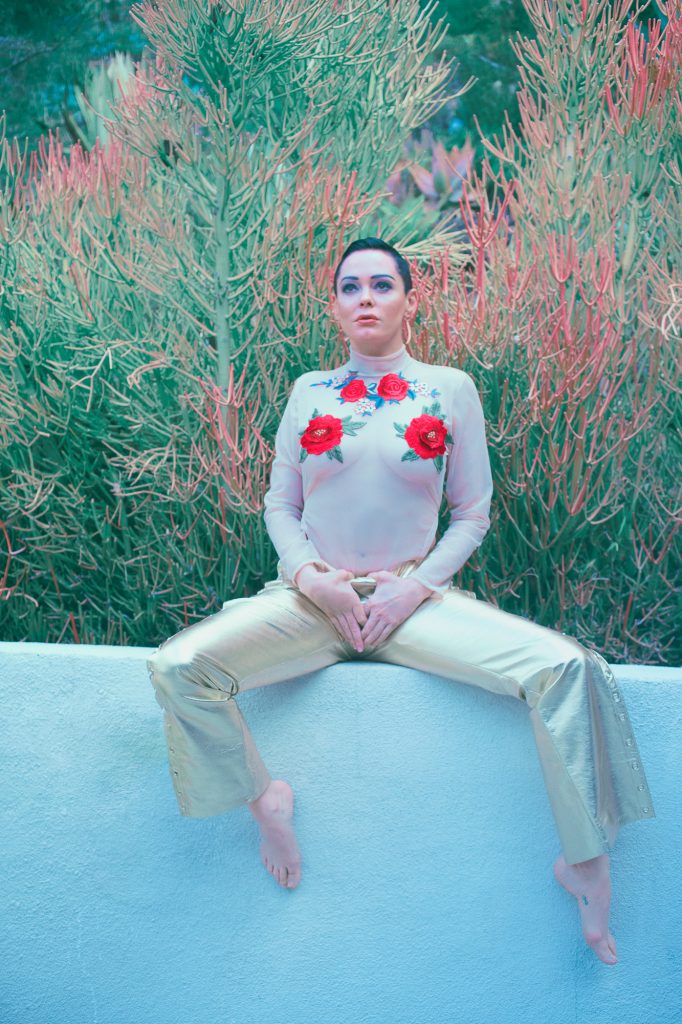
Bodysuit: Músed / Pants: L.A. ROXX
In McGowan’s forthcoming book, which she calls something between a memoir and a manifesto, she wants to engage directly with sexism and social standards. “I want people to learn how to think critically; to question authority. My goal with everything that I do, my art, my book, my music, and films, is to puncture that rigid thought structure and belief system.” As our conversation comes to a close, McGowan touches on her own infamy, and the transformation her life has taken since she left the Hollywood fun house. “I firmly believe in going hard in all ways. I don’t have any reason to go soft; because the world didn’t go soft on me. And it’s time to push back for all of us. It’s time that we speak and it’s time that we are heard. We will not ask to be listened to. We need to make them listen.”
Editor’s note: Since conducting this interview in May 2017, Rose McGowan has come forward, along with many other women, about her sexual assault at the hands of Harvey Weinstein. Posture stands firmly alongside people of all genders and identities who have experienced harassment, abuse, and assault. We will continue to provide a platform for artists and activists who work to dismantle the realities of patriarchal rape culture, which is built upon sexism, classicism, racism, and homophobia.
Editorial Credits:
Writer: Maya Harder-Montoya / @mayaceleste
Photographer: Jennifer Medina / @lulannie
Senior Photo Director: Asher Torres / @ashertorresphotography
Stylist: Phil Gomez / @styledbyphil
Hair/Makeup: Ashley Koley
Photo Assistant: David Hajoo Choi / @davidhajoochoi
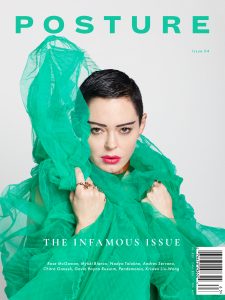 This interview originally appeared in Posture’s fourth print issue — The Infamous Issue — which is now available for sale in our online shop.
This interview originally appeared in Posture’s fourth print issue — The Infamous Issue — which is now available for sale in our online shop.
This 168-page issue showcases original photography and exclusive interviews with creators whose fame is rooted in controversy, radicality, and rebellion. Features include Mykki Blanco, Nadya Tolokno, Andres Serrano, Gavin Rayna Russom, Chitra Ganesh, Amazon Ashley, Pandemonia, and more.

